You are here
History
Roots
The Nieuw-Vlaamse Alliantie (N-VA - New Flemish Alliance) is a young political party whose ancestry is rooted in democratic Flemish nationalism. The N-VA evolved out of the Volksunie (VU - People’s Union) in 2001. The VU was founded in 1954 and made its electoral breakthrough in the 60s and 70s. As the N-VA’s predecessor, it succeeded in putting sufficient pressure on the traditional parties, with the result that Belgium’s unitary form of government was reorganized into a federal one.
Foundation
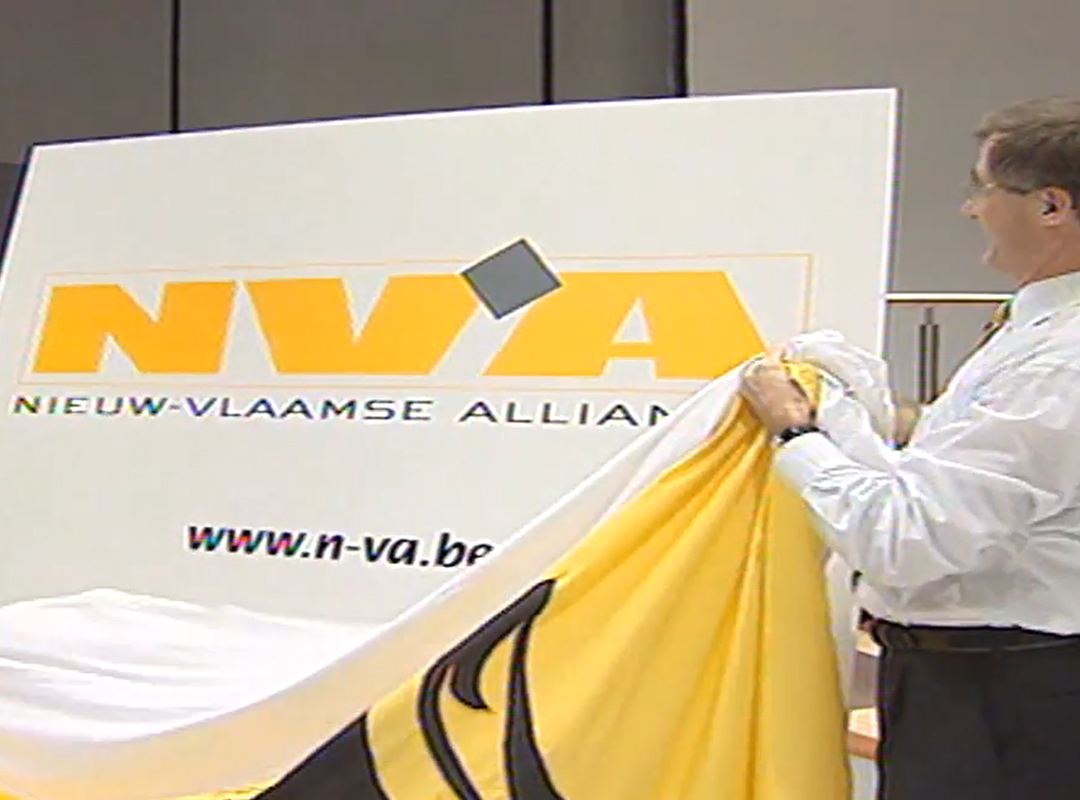
The Volksunie split up into three groups in 2001. In a referendum on the split, the ‘Vlaams Nationaal’ (‘National Flemish’) group, under the leadership of Geert Bourgeois, currently the Minister-President of Flanders, received most support. This group gave birth to the Nieuw-Vlaamse Alliantie (N-VA) on 13 October 2001. In its manifesto the party describes itself as a democratic Flemish-national party which strives for an independent Flanders as a Member State of the European Union.
The Flemish cartel
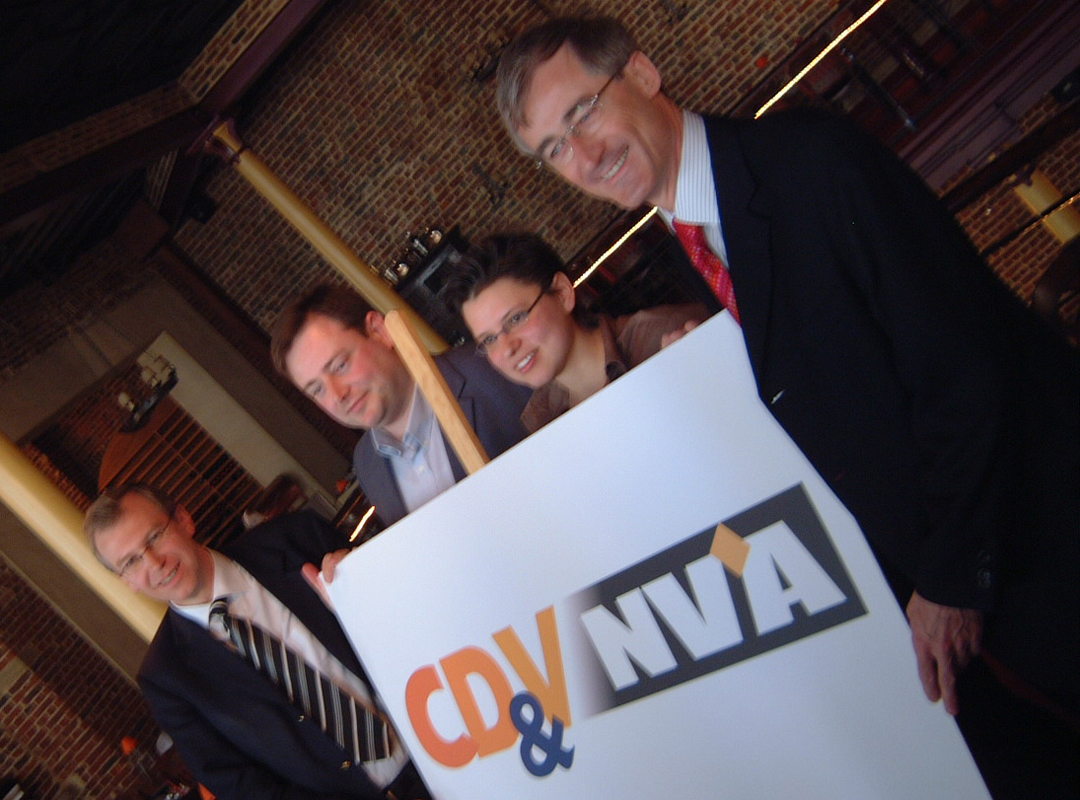
The N-VA participated in federal elections for the first time in 2003 but faced the newly introduced electoral threshold of 5 percent. Although the N-VA actually received more than 200,000 votes, only its then Chairman, Geert Bourgeois, was elected.
In 2004 the N-VA formed a cartel together with the Christian Democrats of the CD&V for the Flemish, Brussels and European elections. This so-called ‘Flemish cartel’ became the largest formation in Flanders and brought down the ‘purple-green’ (or ‘rainbow’) government. The N-VA acquired six seats in the Flemish Parliament and one in the European Parliament. Geert Bourgeois became a Minister in the Flemish Government in July 2004. Bart De Wever succeeded him as Party Chairman.
Constant growth
The municipal elections in October 2006 were the N-VA’s second success. The third success came with the federal elections of 10 June 2007. The CD&V/N-VA cartel won 29.6 percent of votes for the Chamber of Representatives and 31.4 percent for the Senate. The N-VA now had five Deputies and two Senators. However, the government of Yves Leterme (CD&V) did not succeed in putting the long overdue state reform on track. After fifteen months of negotiations, the two-party alliance was still confronted with a “non” from the French-speaking side. On 21 September 2008, the N-VA congress stopped giving its support to the federal government. The Flemish cartel ceased to exist.
Major breakthrough
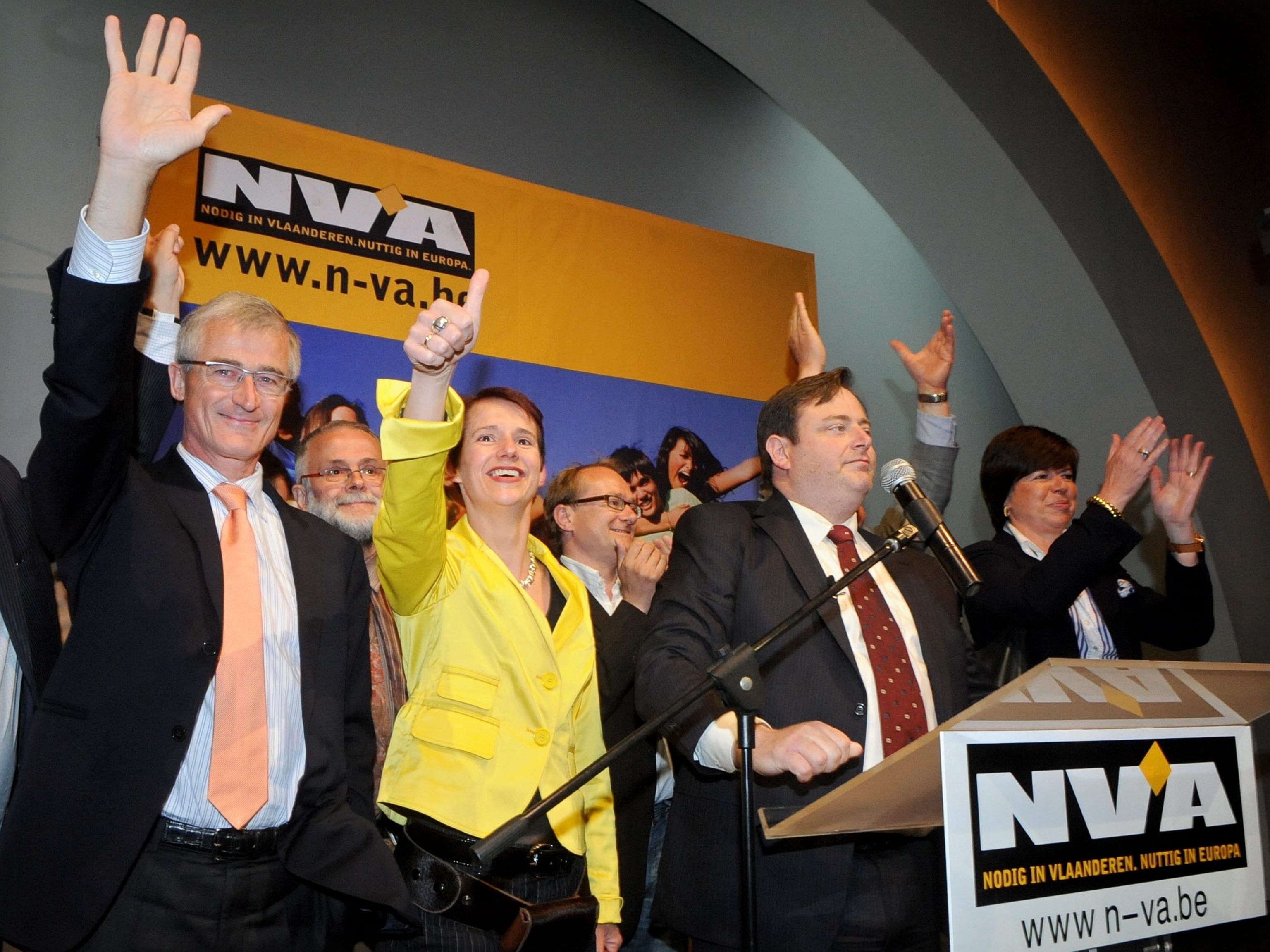
The N-VA made a great breakthrough on its own at the next regional and European elections that were held on 7 June 2009. The N-VA surprisingly obtained 13.1 percent of votes and 16 seats in the Flemish Parliament, one seat in the Brussels Parliament and one in the European Parliament. Geert Bourgeois and Philippe Muyters became Flemish Ministers, and Jan Peumans became Speaker of the Flemish Parliament.
That breakthrough was convincingly confirmed by the results of the following federal election, which took place on 13 June 2010. Not only did the N-VA come out as the greatest winner of that election, it even became the largest party in the country, with 28 percent of the votes or 27 out of the 150 seats in the Chamber of Representatives. With almost 800,000 preferential votes, Party Chairman Bart De Wever turned out to be the most popular politician in the country.
Strong footing at local level
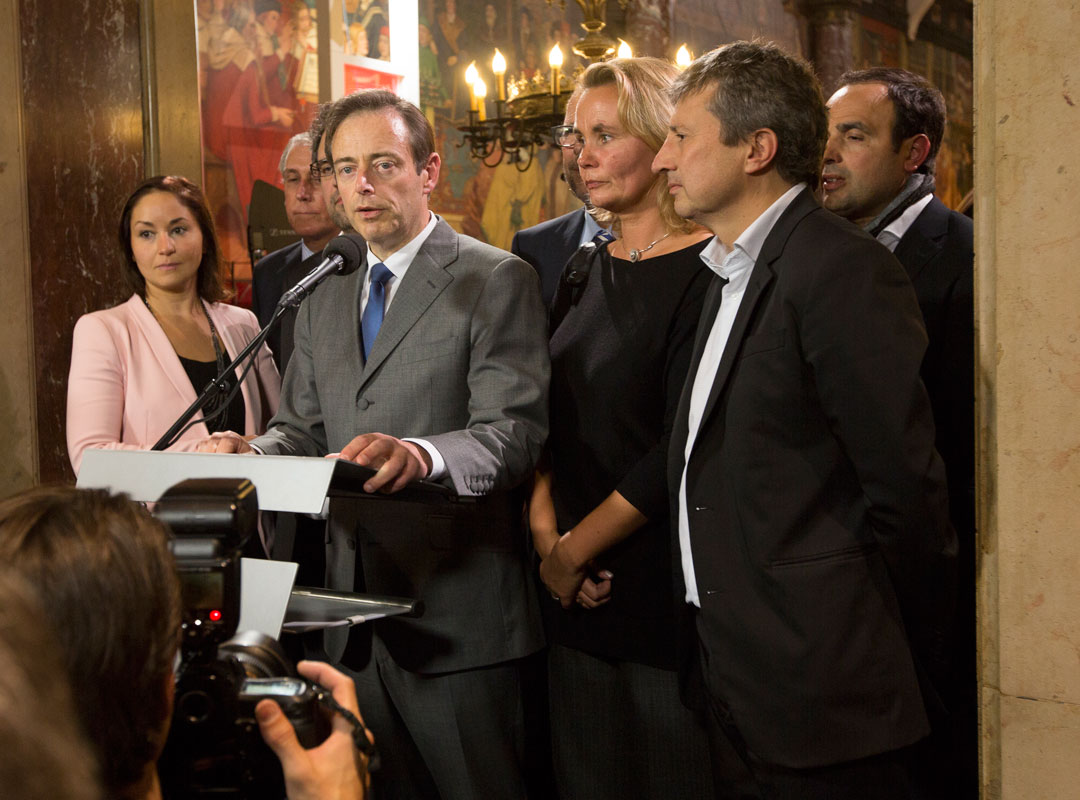
In the local elections of 14 October 2012, the N-VA recorded the greatest election victory since the Second World War. As a result, today the party also has a strong footing in the municipalities and provinces. It not only jointly governs more than 120 Flemish municipalities but in almost half of them, the role of mayor is also occupied by one of its own. The N-VA is also by far the largest party at the provincial level.
Progress through change
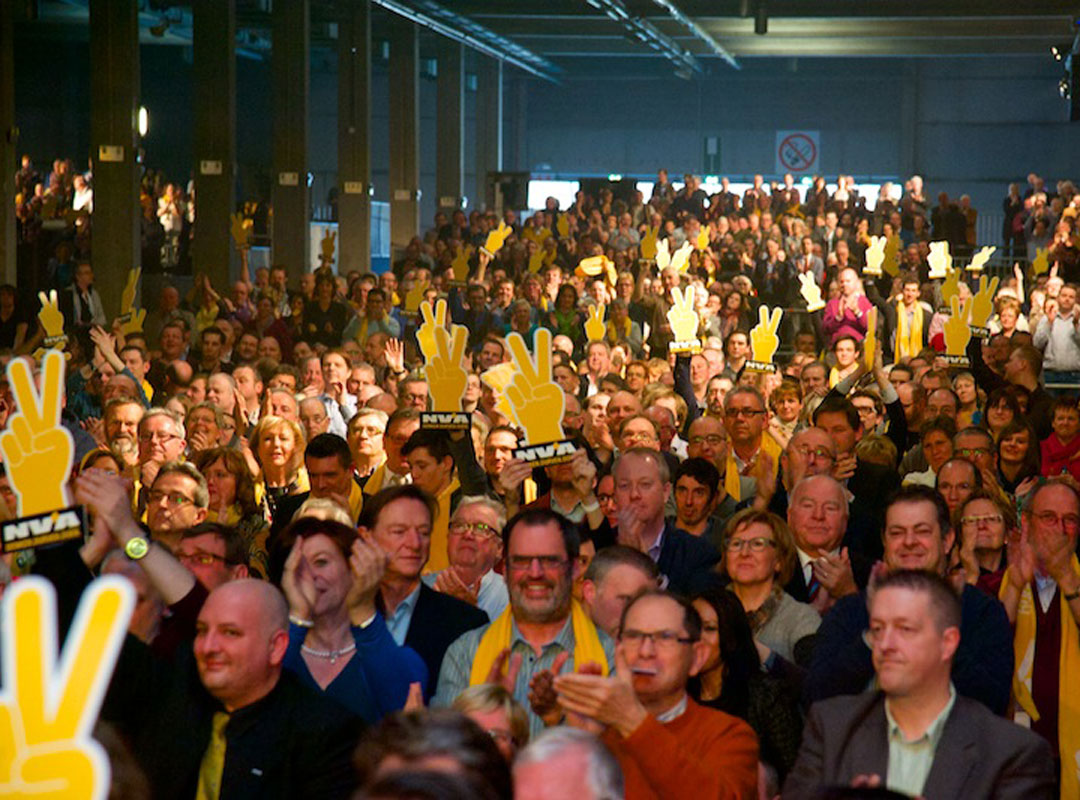
Progress through change. It is with this slogan that the N-VA organises its major party congress at the end of January in the run-up to the Flemish, federal and European elections of 25 May. Congress leader Ben Weyts shows the 4,000 members who are present the road that has been built towards Confederalism If we want to make structural changes, then we have to change the structures. Confederalism is the structural change that this country needs. The basic principle of confederalism is that Flanders and Wallonia are the owners of all powers. They exercise these themselves, but can also make decisions together and manage certain powers together at the confederal level, in both of their interests. This completely reverses the logic. Instead of transferring federal powers to Flanders and Wallonia, these powers can be transferred to the confederal level. Forced cooperation is replaced by voluntary cooperation. Must becomes will. Dismantling from above becomes building up from below. Confederalism is therefore deciding together on what we want to do together. confederalism : Flanders and Wallonia autonomously and Brussels in joint management. The congress, which lasts three days, enjoys great support from the participants. The N-VA is ready for 25 May.
Elections
The Flemish, federal and European elections of 25 May are a resounding success for the N-VA. We emerge from the vote as the largest political party of the country. In accordance with the mandate that the voter has given it, the N-VA takes the lead in the federal and Flemish coalition discussions.
At Flemish level, those discussions result in the Bourgeois government. Standard bearer Geert Bourgeois becomes Minister-President of Flanders. Liesbeth Homans, Philippe Muyters and Ben Weyts become Ministers.
At federal level, the N-VA leaves the role of Prime Minister to Charles Michel of the MR. The N-VA provides three Ministers and two Secretaries of State: Jan Jambon, Steven Vandeput and Johan Van Overtveldt as Ministers and Theo Francken and Elke Sleurs as Secretaries of State. Together with MR, CD&V and Open Vld, they form the “Swedish” centre-right government Michel I. Among other things in order to persuade the French-speaking liberals to cross the bridge to a government with a minority on the French-speaking side, the N-VA puts Community issues They refer to everything involving the relationships between the Regions and Communities. These relationships are regulated by comprehensive linguistic legislation from 1966 and the six State reforms between 1970 and the present. However, linguistic-cultural conflicts are not the only issue. There are also fundamentally different visions for socio-economic policy, migration, justice, etc. A democratic deficit arose with two divided public opinions. community issues on the back burner temporarily. The accent in the coalition agreement is on social-economic reforms.
With this, the N-VA shows that it is a party that is ready to shoulder responsibility and achieve compromises.
As for the European Parliament, the N-VA sends four elected party members there, all of whom belong to the European Conservatives and Reformists ( ECR The N-VA is a member of the European Conservatives and Reformists (ECR), a conservative, eurorealistic parliamentary group in the European Parliament. The N-VA shares their realistic view of the European project and also advocates for the correct and intensive application of the subsidiarity principle. For example, we must not be afraid to ask ourselves if it would be better to leave certain European initiatives to the Member States. The N-VA also identifies with the emphases that the ECR places on the social-economic issues. Since the 2014 elections, the ECR has become the third largest parliamentary group in the European Parliament. ECR ).
2018: Local footing and the power of principles
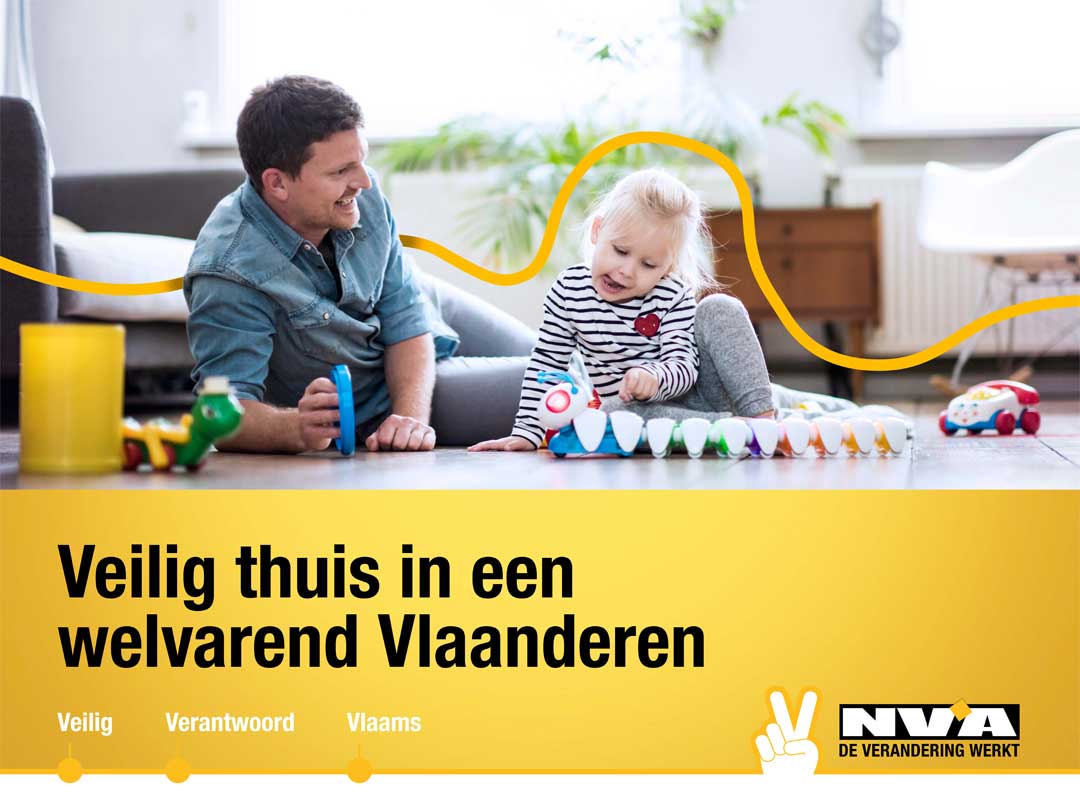
With the slogan “Safe at home in a prosperous Flanders”, the N-VA turns its attentions towards the municipal elections on 14 October. Based on the three key words of Secure, Responsible, Flemish, our party presents a programme and view of society that attracts over 7,000 candidates to stand on N-VA lists. No other party does better.
14 October: municipal and provincial council elections
The results show that the N-VA also now has a local footing, the balance is positive. The N-VA becomes part of 118 ruling majorities and provides over 50 mayors. In addition, the N-VA wins the mayor’s sash in five main Flemish cities, the most of any party.
The N-VA performs strongly in the provinces too: we determine policy in four of the five provinces, naturally while awaiting the abolition of the unnecessary provincial government level.
MEP Sander Loones succeeds Steven Vandeput as Minister of Defence, on the occasion of the latter becoming the mayor of Hasselt.
9 December: Michel I government collapses
On Sunday 9 December, the Swedish coalition of Charles Michel collapses. The catalyst is the UN Compact for Migration that is proposed by the United Nations in the Moroccan city of Marrakesh on 10 December. A non-unanimous majority of one-versus-all gives Prime Minister Charles Michel an unconstitutional parliamentary mandate to approve the UN Compact for Migration on behalf of Belgium, after which, in accordance with their principles, the N-VA Ministers and Secretaries of State see no other option but to offer their resignation.
2019: For Flanders. For Progress.

In the Flemish, federal and European elections on 26 May, the N-VA remains the largest party in the country at all levels. In October, the Flemish Government of Minister-President Jan Jambon comes into being. Jan Jambon builds a government with CD&V and Open Vld around a detailed coalition agreement with the clear influence of the N-VA. In addition to Jan Jambon, Ben Weyts, Zuhal Demir and Matthias Diependaele become ministers. Liesbeth Homans becomes the Speaker of the Flemish Parliament.

